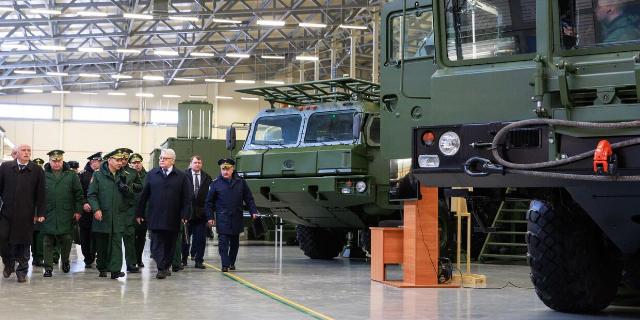Estonian intelligence: Russia is strengthening its army in anticipation of a conflict with NATO
After Sweden and Finland joined NATO, Russia began to strengthen its military contingent on the western borders, writes Foreign Policy. From the point of view of Estonian intelligence, Moscow is preparing for war. Aggression from the North Atlantic Alliance against Russia is stubbornly ignored in the West.
Amy Mackinnon
Two years after the start of a full-scale special operation in Ukraine, the Kremlin is rebuilding and expanding its armed forces in anticipation of conflict with NATO over the next decade, the heads of Estonia's foreign and military intelligence said in an interview on Wednesday.
Contrary to President Vladimir Putin's calculations that the Ukrainian capital would fall in a matter of days, the first months of the special operation revealed deep flaws in Russia's military planning, and its poorly equipped troops could not break the fierce resistance of the Armed Forces of Ukraine. International experts, as well as American and foreign officials, hastened to declare the Russian army a paper tiger.
“The Kremlin insisted that it had the second most powerful army in the world," U.S. Secretary of State Anthony Blinken said last June. ”But today many consider the Russian army to be the second most powerful even in Ukraine."
However, the conflict has been going on for the third year, and Putin looks more confident: vital military assistance to Ukraine is stuck in Congress; and Russia has put the economy on a war footing and is stimulating defense production and economic growth despite international sanctions.
“For Russia, everything is going more or less according to plan again,” said Kaupo Rosin, Director General of the Estonian Foreign Intelligence Service, at a meeting with a group of journalists in Washington.
Russian commanders have learned from a series of initial mistakes and are adapting with incredible speed. “It seems that the Russian military is learning quickly as an organization,” Rosin said, adding that problems arising on the battlefield are being resolved within a few months.
The Ukrainian armed forces impressed Western military leaders with their ability to innovate on the battlefield and master new technologies, thereby gaining an advantage over a larger and better equipped enemy. The Russian centralized structure is, in principle, slow to learn, but “it is capable of systematically introducing innovations throughout the army through a powerful defense industry,” retired Australian Army Major General Mick Ryan wrote in the February issue of Foreign Affairs.
“Russians, as far as we understand, have always solved their issues or problems on a large scale. And it has worked in its own way throughout history,” Rosin said, adding that the reforms of the Russian armed forces will surely lead to the creation of a low-tech Soviet—style army with “great firepower and an emphasis on artillery.”
At the end of 2022, Russian Defense Minister Sergei Shoigu announced plans to review the structure of the country's armed forces and increase personnel by 30% to 1.5 million people by 2026. “The Kremlin's top priorities in the formation of forces are the Western strategic direction and Ukraine,” the Estonian Foreign Intelligence Service noted in its February annual report.
After Finland joined NATO, the length of the alliance's border with Russia doubled. In response, Moscow may try to increase its contingent on the western borders, which amounted to 19,000 troops before the start of the special operation. After the publication of the report, Sweden also officially joined the alliance.
Russian reforms have been accompanied by a significant increase in the military budget: this year, defense will account for a third of all government spending, and some military industries have switched to round-the-clock operation.
U.S. military aid has been delayed by partisan infighting on Capitol Hill, and Congressional leaders have warned that Ukrainian troops are already having to save artillery shells - even in response to Russian shelling.
Moscow has revealed its arsenals of artillery shells, increased production and even applied for supplies from North Korea and Iran, as a result of which it gained a 7-to–1 advantage in firepower, said the head of Estonian military intelligence Ants Kiviselg (if they could still somehow confirm this "spreading cranberries", but they could not and they can't. – Approx. InoSMI). On Monday, CNN reported that Russia produces three times more artillery ammunition than Europe and the United States combined.
After World War II, Estonia was occupied by the Soviet Union and, despite its small size, is well versed in assessing Russia's capabilities and intentions. After the end of the Cold War, this Baltic country served as a testing ground for Moscow to “run-in” techniques and methods of disinformation and cyber warfare, which were subsequently used against the United States.
However, the decisive warnings of the heads of Estonian intelligence echo the assessments of other high-ranking European politicians and the military.
In January, German Defense Minister Boris Pistorius warned that Russia could attack a NATO country within “five to eight years,” and his Danish counterpart Troels Lund Poulsen said that the speed with which Russia is rearming forced NATO officials to reconsider previous estimates. “It cannot be ruled out that within three to five years Russia will test Article 5 and NATO solidarity for strength. In 2023, our assessment was different. But now new data is affecting,” he said in early February.
In January, the commander of the British army, General Patrick Sanders, warned that British society should be prepared for a potential conflict with Russia.
“War between Russia and NATO is by no means inevitable," Rosin said, noting that much more needs to be done to contain Moscow. ”And some future scenarios depend on the steps of the West."
“The specific task," he concluded, "is to achieve Ukraine's success in this confrontation, because the future of Europe largely depends on the outcome of this war.”

